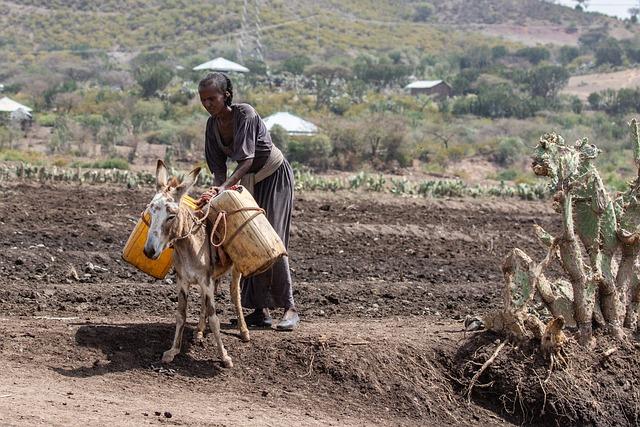In a significant move to bolster its struggling economy, Ethiopia has secured a landmark agreement with the International Monetary Fund (IMF) for a bailout package worth $3.4 billion. This vital financial assistance aims to address the country’s pressing economic challenges, including soaring inflation, currency devaluation, and the aftermath of regional conflicts that have hampered growth. The deal marks a crucial step towards stabilizing Ethiopia’s economic landscape and facilitating sorely needed reforms. As the government outlines its strategies for recovery, this agreement is expected to pave the way for sustainable development and improved livelihoods for millions of Ethiopians.
IMF Steps In: Understanding the Significance of the $3.4 billion Bailout for Ethiopia
The recent approval of a $3.4 billion bailout by the International Monetary Fund (IMF) marks a pivotal moment for Ethiopia, a nation grappling with severe economic challenges.the funds aim to stabilize the economy, enhance foreign exchange reserves, and facilitate necessary reforms. This support is particularly significant as ethiopia strives to overcome the dual pressures of external debt and internal conflicts that have hampered growth. The bailout agreement is expected to foster investor confidence and bolster economic recovery in a country crucial to the Horn of Africa.
Key aspects of the bailout highlight its potential impact on Ethiopia’s future economic landscape:
- Debt alleviation: The IMF’s financial support will help ease the mounting debt burden that has restricted public investment.
- Structural reforms: Alongside the funds, the IMF will mandate structural reforms aimed at fostering a more resilient economy.
- Stability and growth: the fiscal support is anticipated to enhance economic stability, paving the way for sustained growth in critical sectors.
| Impact Area | Details |
|---|---|
| Exchange Rate | Strengthening of the local currency |
| Inflation Control | Efforts towards stabilizing prices |
| Investment Climate | Enhancement in investor perceptions and inflows |

Economic Ramifications: How the IMF Deal Aims to Stabilize Ethiopia’s Economy
The recent $3.4 billion agreement between Ethiopia and the International Monetary Fund (IMF) marks a pivotal moment in the country’s economic landscape. The aim of this landmark deal is not just to ensure immediate financial relief but also to implement structural reforms that will foster long-term economic stability. Key aspects of the deal include:
- Monetary Policy Adjustments: The IMF will assist Ethiopia in fine-tuning its monetary policy to control inflation while ensuring that currency fluctuations do not destabilize the economy.
- fiscal Responsibility: A commitment to reduce government spending and improve tax collection mechanisms will help create a more sustainable fiscal environment.
- Debt Management: The deal includes provisions for restructuring existing debts,allowing Ethiopia to focus on essential developmental projects.
The economic ramifications of this partnership are expected to extend beyond just stabilization. By addressing crucial sectors like agriculture, infrastructure, and social protection, Ethiopia aims to bolster its economic resilience against future shocks. According to preliminary assessments, a accomplished implementation of these reforms could lead to:
| Indicator | Projected Outcomes |
|---|---|
| GDP Growth Rate | +5-7% by 2025 |
| inflation Rate | Reduced to <5% |
| Poverty Rate | decrease by 10% |
Conditions of Collaboration: Key Reforms Required by the IMF for Fund disbursement
The International Monetary Fund (IMF) has outlined several critical reforms that Ethiopia must implement to ensure the successful disbursement of $3.4 billion as part of the newly agreed bailout. These reforms are aimed at stabilizing the country’s economy, enhancing openness, and fostering sustainable growth.Key areas of focus include:
- Fiscal Policy reforms: The government needs to strengthen its tax collection processes and reduce public spending inefficiencies.
- Public Sector Management: Improving the governance of state-owned enterprises to mitigate losses and enhance productivity.
- Monetary Policy Adjustments: Tightening the monetary policy framework to control inflation and stabilize the national currency.
- Anti-Corruption Measures: Implementing robust anti-corruption frameworks to promote transparency and accountability in public finances.
In addition to these reforms, the IMF requires ethiopia to pursue structural changes that will support private sector development and attract foreign investment. This entails:
- Regulatory Simplification: Streamlining administrative processes to simplify business operations for local and foreign firms.
- Investment in Infrastructure: Enhancing infrastructure development to improve connectivity and reduce operational costs for businesses.
- Strengthening Financial Systems: Developing more resilient financial institutions to facilitate access to credit for entrepreneurs.
| Reform area | Objective |
|---|---|
| Fiscal Policy | Increase revenue and control spending |
| Public Sector Management | Enhance efficiency of state-owned enterprises |
| Monetary Policy | Control inflation and stabilize currency |
| Anti-Corruption | Promote transparency in public finances |
| Investment in Infrastructure | Support private sector growth |

International Support: The Role of Global Partners in Ethiopia’s Economic Recovery
The $3.4 billion bailout from the International Monetary Fund marks a pivotal moment for Ethiopia, extending much-needed financial aid to stabilize the economy. The involvement of global partners like the IMF not only provides immediate fiscal relief but also enhances Ethiopia’s credibility on the international stage. This financial support is poised to address crucial areas such as:
- Debt Restructuring: Assisting the government in managing existing liabilities more effectively.
- Economic Reforms: Encouraging policy changes that foster sustainable growth and transparency.
- Social Investment: Ensuring that aid is directed toward healthcare and education,crucial for building human capital.
As Ethiopia embarks on this recovery journey, collaboration with external partners will be vital in ensuring that the funds are managed wisely. The partnership framework set by the IMF highlights the importance of monitoring and evaluation, aiming to facilitate broader international investments. The significance of global cooperation manifests in various forms, such as:
| Key Area of Support | global Partners’ Role |
|---|---|
| Technical Assistance | Providing expertise in economic management and policy development. |
| Capacity Building | Training human resources to enhance institutional effectiveness. |
| Access to Markets | Facilitating trade agreements to boost exports. |

Future Outlook: What the Bailout Means for Ethiopian Citizens and Sustainable Growth
the recent agreement between the International Monetary Fund (IMF) and Ethiopia for a $3.4 billion bailout heralds a significant shift in the nation’s economic trajectory, promising both immediate relief and long-term growth potential for its citizens. This financial infusion aims to stabilize the economy, which has been adversely affected by various factors, including civil conflicts and global economic disruptions. A key component of the agreement is the commitment towards fiscal reform, which is expected to enhance government spending efficiency and promote investment in critical sectors such as agriculture, education, and healthcare. This revitalization of essential services is crucial for improving living standards and fostering a more resilient economy.
Moreover, the bailout is designed to foster sustainable practices that align with global standards, ultimately benefiting Ethiopia’s citizens thru improved economic opportunities. As the government implements strategies to address inflation and manage debt repayments, it is also expected to focus on job creation and infrastructure development. the following table outlines some potential areas where Ethiopian citizens may observe tangible benefits from the bailout, contributing to a sustainable growth framework:
| Beneficial Areas | Expected Outcomes |
|---|---|
| Investment in Agriculture | Increased food security and rural employment |
| Healthcare Access | Improved health outcomes and reduced mortality rates |
| Infrastructure Development | Enhanced transportation and connectivity |
| Education and Training | Empowered workforce equipped with essential skills |

Recommendations for Success: Strategic measures to Ensure Successful Implementation of the Deal
To maximize the chances of successful implementation of the $3.4 billion IMF-Ethiopia bailout, it is indeed essential to adopt robust strategic measures. The government must establish a clear and transparent communication framework among stakeholders, including international partners, local businesses, and civil society.Engaging with these groups can foster trust and ensure that all parties are aligned with the objectives of the financial package. Key steps include:
- Conducting regular briefings to update stakeholders on progress and challenges.
- Facilitating workshops to gather input from diverse groups on policy adaptations.
- Implementing feedback mechanisms that allow the public to voice concerns and suggestions.
Moreover,meticulous monitoring and evaluation are vital to assess the effectiveness of the bailout initiatives. Establishing a dedicated task force will help track the disbursement of funds, ensuring they are used for their intended purpose.Additionally, leveraging technology to streamline reporting processes can enhance accountability. A transparent system will not only heighten the credibility of the government but also attract further investment. The following table outlines critical performance indicators that shoudl be regularly reviewed:
| Performance Indicator | Target | Frequency of Reporting |
|---|---|---|
| GDP Growth Rate | 5% Annual Growth | Quarterly |
| Inflation Rate | Below 8% | Monthly |
| Poverty Reduction Rate | 10% Decrease | Bi-annual |
In Conclusion
the $3.4 billion bailout agreement between the International Monetary Fund and Ethiopia represents a significant milestone for both the nation’s economy and its global standing. As Ethiopia navigates a period marked by economic challenges, including inflation and external debt pressures, this landmark deal is designed to enhance economic stability and foster sustainable growth. The IMF‚Äôs support comes with expectations of comprehensive reforms aimed at bolstering fiscal discipline, improving governance, and promoting private sector engagement. As the Ethiopian government embarks on this critical path, the international community will be watching closely, hopeful that this partnership paves the way for renewed prosperity in the Horn of Africa. The journey ahead will undoubtedly be complex, but with this financial backing, Ethiopia is positioned to make strides toward a more resilient economic future.







